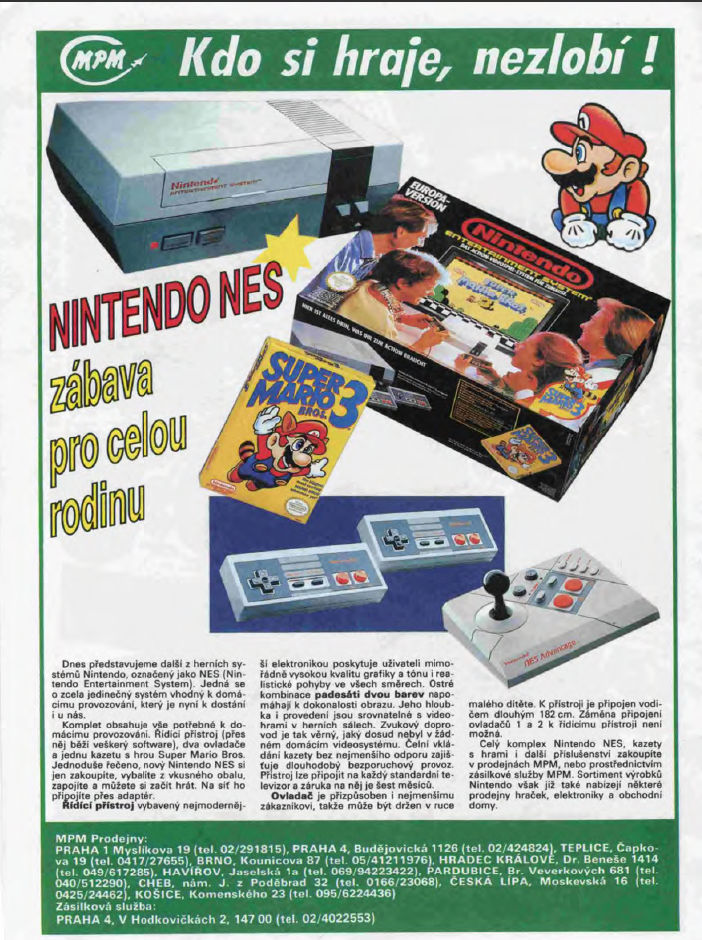Platform: Nintendo Entertainment System
Armadillo
Hatris
Dudes with Attitude
Solstice: The Quest for the Staff of Demnos
The Krion Conquest
Home Alone 2: Lost in New York
Faria: A World of Mystery and Danger!
Captain America and the Avengers
Super Spike V'Ball
Action 52
Adventures of Lolo 3
Barbie
New Trivia!
Nuts & Milk
Little Nemo: The Dream Master
New Ghostbusters II
Bases Loaded 4
Godzilla: Monster of Monsters
Wrecking Crew
Donkey Kong 3
Mike Tyson's Intergalactic Power Punch
Final Fantasy
Disney's DuckTales
Balloon Fight
Kirby's Adventure
Rampart
Mechanized Attack
Baseball
Star Trek V: The Final Frontier
The Adventures of Bayou Billy
Baby Boomer
Power Punch II
Tagin' Dragon
Ufouria: The Saga
10-Yard Fight
Thunderbirds
New Trivia!
Ice Climber
Street Fighter
Mickey Mousecapade
Color a Dinosaur
Metal Storm
Wally Bear and the NO! Gang
Kid Icarus
Snake Rattle 'n' Roll
Chiller
Batman: The Video Game
Rambo
Yeah Yeah Beebiss II
The Simpsons: Bart vs. The Space Mutants
Maniac Mansion
Battle Chess
Viewing Single Trivia
▲
2
▼
Popular conceptions about Nintendo's release history in Europe claim that their hardware was never released in the former Eastern Bloc until the 21st century. Rather, these countries instead saw the proliferation of various clone consoles called "Famiclones", such as the Dendy (a Taiwanese-built bootleg that achieved widespread popularity in the Commonwealth of Independent States, made up of the ex-republics of the former Soviet Union) and the Pegasus (which became as popular in Poland as the Dendy did in Eastern Europe). However, while Famiclones did indeed dominate the Eastern European gaming market during the 1990s, Nintendo was not only aware of this, but actively attempted to halt the spread of bootlegs in these regions in favor of officially sanctioned products.
In 1994, Nintendo made a deal with Steepler, the Dendy's distributor in Eastern Europe, to permit continued sale of the Dendy in exchange for equal distribution of the Super Nintendo Entertainment System and Game Boy in the Commonwealth of Independent States; official Russian releases of these systems even included Dendy stickers on the packaging to reflect the arrangement. Meanwhile, in various other parts of the former Eastern Bloc, Nintendo made deals with other third-party distributors; among others, the NES, SNES, and Game Boy saw official releases in Poland, Hungary, and the former territories of Yugoslavia and Czechoslovakia during 1993–1994.
In 1994, Nintendo made a deal with Steepler, the Dendy's distributor in Eastern Europe, to permit continued sale of the Dendy in exchange for equal distribution of the Super Nintendo Entertainment System and Game Boy in the Commonwealth of Independent States; official Russian releases of these systems even included Dendy stickers on the packaging to reflect the arrangement. Meanwhile, in various other parts of the former Eastern Bloc, Nintendo made deals with other third-party distributors; among others, the NES, SNES, and Game Boy saw official releases in Poland, Hungary, and the former territories of Yugoslavia and Czechoslovakia during 1993–1994.
Joshua Rogers video about Nintendo in Eastern and Central Europe:
https://www.youtube.com/watch?v=q75Re7deJC0
Russian-language articles about the Nintendo/Steepler deal:
https://web.archive.org/web/20190427025842/https://www.kommersant.ru/doc/94004
https://web.archive.org/web/20240601223552/https://dtf.ru/games/970617-legenda-o-slone-kak-it-kompaniya-steepler-sozdala-dendy-i-osnovala-rossiiskii-konsolnyi-rynok
https://www.youtube.com/watch?v=q75Re7deJC0
Russian-language articles about the Nintendo/Steepler deal:
https://web.archive.org/web/20190427025842/https://www.kommersant.ru/doc/94004
https://web.archive.org/web/20240601223552/https://dtf.ru/games/970617-legenda-o-slone-kak-it-kompaniya-steepler-sozdala-dendy-i-osnovala-rossiiskii-konsolnyi-rynok
Comments (0)
You must be logged in to post comments.
